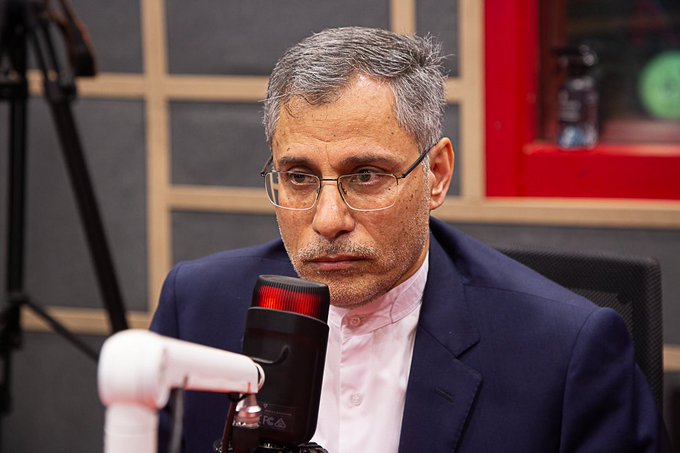Business
Iran Pushes for Interpol Probe as Kenya-Iran Tea Trade Remains in Limbo Over Quality Scandal
The crisis stems from the activities of Cup of Joe Limited, a Mombasa-based tea export company owned by businessman Joseph Njuguna Wainaina, a close associate of impeached former Deputy President Rigathi Gachagua.

Diplomatic tensions escalate as Tehran demands international intervention in multi-billion-dollar fraud case involving Kenyan tea exporter
Nearly eight months after Iran suspended imports of Kenyan tea following a massive quality fraud scandal, diplomatic efforts to restore the lucrative trade relationship face new complications as Tehran pushes for Interpol involvement in investigating the case that has already resulted in prison sentences for Iranian officials and the collapse of a $3.7 billion corruption scheme.
The crisis stems from the activities of Cup of Joe Limited, a Mombasa-based tea export company owned by businessman Joseph Njuguna Wainaina, a close associate of impeached former Deputy President Rigathi Gachagua.
The company served as the crucial intermediary in a sophisticated fraud operation that saw Iranian firm Debsh Tea Co import low-grade Kenyan tea at $2 per kilogram, only to fraudulently relabel and sell it as premium Indian Darjeeling tea for up to $14 per kilogram.
The Billion-Dollar Scandal Unfolds
Iranian court documents reveal the staggering scope of the corruption. Between 2019 and 2022, Debsh Tea received $3.37 billion in subsidized foreign currency ostensibly to import tea and machinery.
However, the company diverted $1.4 billion to the free market for profit while engaging in elaborate fraud schemes that eventually ensnared government officials and triggered a diplomatic crisis.
The scheme worked through Cup of Joe’s strategic positioning as a premium tea exporter, complete with ISO 22000, HACCP, and GMP certifications while marketing halal and organic certified products.
The company operated through Dubai warehouses via Chai Trading, a subsidiary of the Kenya Tea Development Agency (KTDA), creating a complex web that masked the fraudulent activities.
What made the operation particularly audacious was Cup of Joe’s ability to facilitate payments not only in U.S. dollars but also in UAE dirhams—a capability that surprised other exporters and should have raised red flags among regulators.
This multi-currency operation gave the company significant advantages over competitors while enabling the massive price manipulation that characterized the fraud.
Swift Iranian Justice, Slow Kenyan Response
Iranian authorities moved decisively once the scandal emerged. Debsh Tea CEO Akbar Rahimi-Darabad received a 66-year prison sentence, effectively 25 years under concurrent sentencing rules, for disrupting Iran’s economy, smuggling foreign currency, and bribery.
Two former Iranian ministers, Javad Sadatinejad and Reza Fatemi Amin, were sentenced to one and two years respectively for their roles in the scheme that unfolded under the late President Ebrahim Raisi.
However, Iranian officials have expressed mounting frustration with Kenya’s relatively sluggish response to demands for action against local intermediaries allegedly complicit in the fraud.
This dissatisfaction has now evolved into calls for Interpol involvement, raising the stakes considerably and potentially complicating Kenya’s efforts to restore trade relations.
In August, Agriculture Cabinet Secretary Mutahi Kagwe announced that a bilateral commission had agreed that Kenyan tea exports to Iran would resume within 60 days.
However, this timeline appears increasingly unrealistic as Tehran escalates its demands for international oversight of the investigation.
Continuing Concerns
Agriculture Principal Secretary Kipronoh Ronoh issued a directive to the Tea Board of Kenya canceling all trading licenses held by Cup of Joe Limited, emphasizing that “we have taken this serious direction to bring order to the tea sector” as part of broader industry reforms aimed at ensuring accountability and stability.
Yet industry sources reveal troubling gaps in enforcement.
Despite the Tea Board of Kenya announcing the suspension of Cup of Joe’s license following the scandal, the company was deregistered and set to face prosecution.
However, concerns persist that the firm may continue operating through intermediaries and alternative sourcing arrangements, potentially undermining efforts to demonstrate Kenya’s commitment to trade integrity.
The regulatory response has exposed deeper issues within Kenya’s tea export oversight system.
Critics have accused the Kenya Tea Development Agency and government officials of colluding to manipulate the Mombasa tea auction by setting artificially high reserve prices, eliminating competition in ways that aligned with Gachagua’s political promises of higher revenues for tea farmers.
Economic Stakes and Diplomatic Fallout
The scandal threatens Kenya’s position as the world’s leading black tea exporter at a particularly vulnerable time.
Kenya’s exports to Iran were estimated at Sh5.98 billion in 2023, making Iran a crucial market when other traditional buyers face constraints.
The loss of Sudan as a major buyer, combined with reduced imports from Egypt and Pakistan due to foreign currency shortages, has left Kenya’s tea sector exposed to the Iranian market suspension.
Kenya’s tea industry contributes nearly a quarter of the country’s foreign exchange earnings, making the Iranian market suspension particularly damaging to the broader economy.
With diplomatic tensions escalating beyond commercial considerations, the scandal has created ripple effects that extend far beyond the tea sector.
The timing could not be worse for Kenya’s agricultural export strategy.
President William Ruto’s administration established a task force in late 2023 to address broader issues of unsold tea stocks, but the Debsh Tea scandal has overshadowed these efforts and created new challenges for market diversification.
Political Connections Under Scrutiny
Cup of Joe’s central role in the scandal has thrust Wainaina’s extensive business connections under intense scrutiny.
Beyond tea exports, Wainaina operates in multiple sectors, including supplying bitumen from Iran to the South African market—dealings that established his Iranian connections years before the tea fraud emerged.
Industry insiders reveal that the relationship between the Kenyan government and Debsh Tea Co crystallized in late 2022 when the Kenya Kwanza administration took power, with Gachagua championing higher tea prices as part of his political strategy to expand his base in tea-growing regions of central Kenya.
The connection between political promises and the fraudulent scheme highlights the risks of allowing export intermediaries to operate without adequate oversight, particularly when political considerations influence market dynamics.
Way Forward
As Kenya seeks to rebuild trust with Iranian buyers and restore market access, the Cup of Joe scandal serves as a stark reminder of the vulnerabilities in the country’s export oversight systems.
The government’s cancellation of the company’s licenses, while potentially too late to prevent immediate market loss, represents an attempt to demonstrate commitment to trade integrity.
However, Iran’s push for Interpol involvement suggests that Tehran views Kenya’s response as insufficient.
This international dimension adds complexity to what began as a bilateral trade dispute and could establish precedents for how future export fraud cases are handled.
The scandal’s resolution will likely influence Kenya’s broader tea export strategy, potentially leading to enhanced monitoring of export intermediaries and stricter compliance requirements for companies dealing with high-value international markets.
For tea farmers and the broader industry, the Cup of Joe case underscores the vulnerability of Kenya’s export-dependent agricultural sector to corporate malfeasance enabled by inadequate regulatory oversight.
As both countries navigate the diplomatic and commercial fallout, the ultimate test will be whether Kenya can implement sufficient reforms to satisfy Iranian demands for accountability while preserving what remains of this crucial trade relationship.
The involvement of Interpol, if it materializes, would mark a significant escalation that could influence how both countries approach future trade partnerships and regulatory cooperation.
Kenya Insights allows guest blogging, if you want to be published on Kenya’s most authoritative and accurate blog, have an expose, news TIPS, story angles, human interest stories, drop us an email on [email protected] or via Telegram
-

 Business2 weeks ago
Business2 weeks agobetPawa Empire Crumbles: Mr Eazi’s Betting Gambit Unravels Amid Partner’s Shadowy Deals
-

 Business1 week ago
Business1 week agoMinnesota Fraud, Rice Saga, Medical Equipment Deal: Why BBS Mall Owner Abdiweli Hassan is Becoming The Face of Controversial Somali Businessman in Nairobi
-

 News1 week ago
News1 week agoDCI Probes Meridian Equator Hospital After Botched Procedure That Killed a Lawyer
-

 Politics1 week ago
Politics1 week agoYour Excellency! How Ida’s New Job Title From Ruto’s Envoy Job Is Likely to Impact Luo Politics Post Raila
-

 Investigations2 weeks ago
Investigations2 weeks agoEXPOSED: SHA Officials Approve Higher Payments for Family, Friends as Poor Patients Pay Out of Pocket
-

 Business1 day ago
Business1 day agoCooking Fuel Firm Koko Collapses After Govt Blocks Sh23bn Carbon Deal
-

 News1 week ago
News1 week agoKenya Stares At Health Catastrophe As US Abandons WHO, Threatens Billions In Disease Fighting Programmes
-

 Politics2 weeks ago
Politics2 weeks agoJaramogi Clan Tells Raila Jr, Winnie Against Disrespecting Their Uncle Oburu, Warns of Curses
















